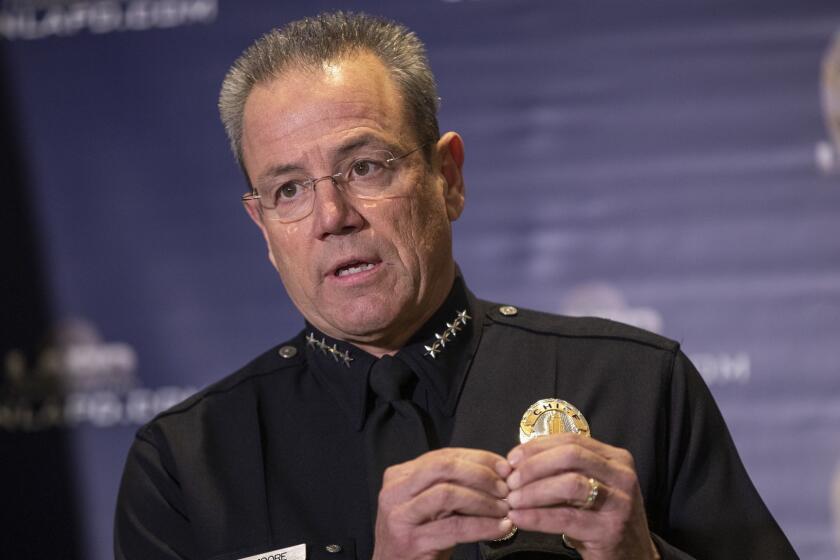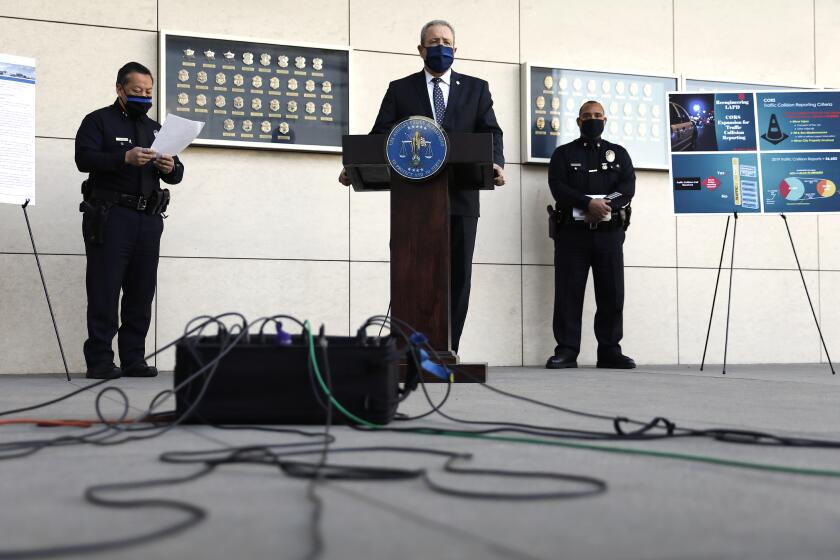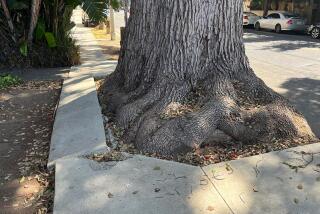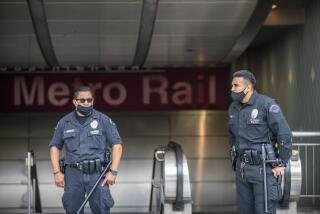Will LAPD hand off traffic enforcement? Patience for promised study wears thin
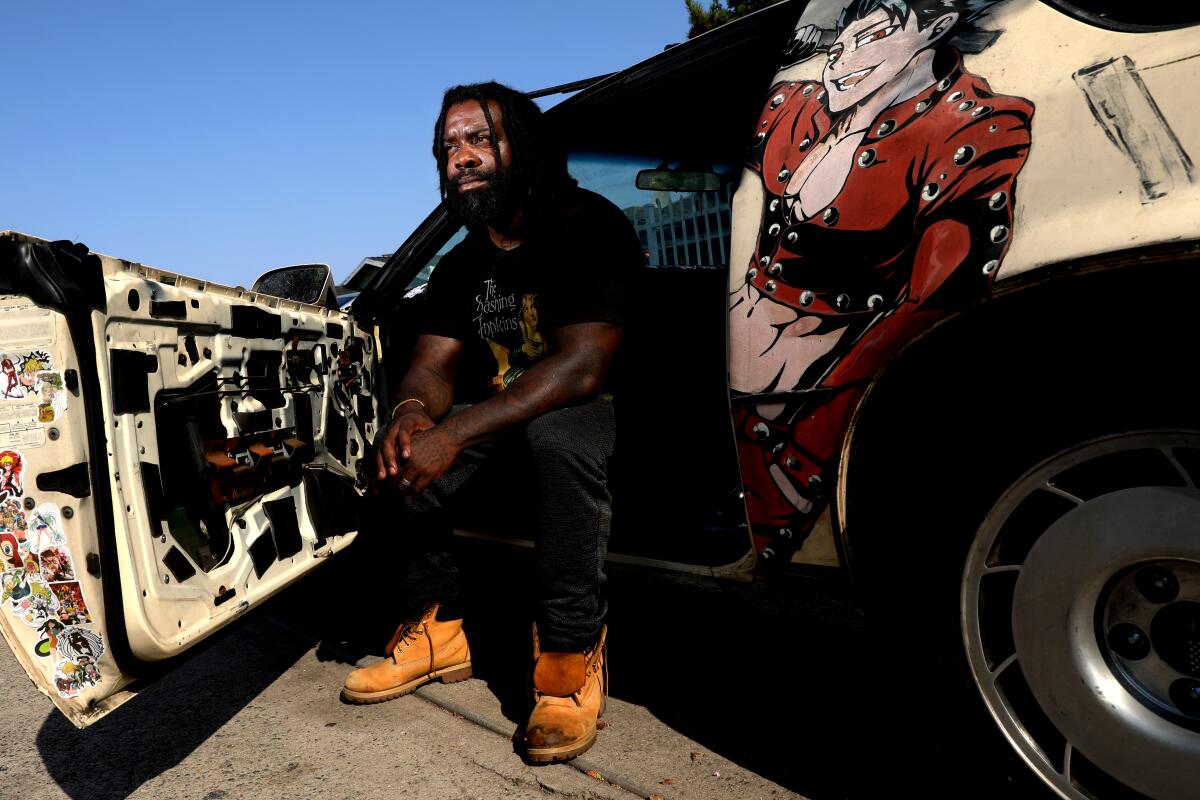
- Share via
More than a year after the Los Angeles City Council raised the prospect of removing armed police officers from traffic enforcement, and more than six months since it ordered the city transportation department to produce a report on alternatives, the work has yet to begin.
Transportation officials blamed the delay in part on “constrained resources” amid the COVID-19 pandemic but say they are now making progress — soliciting contractors interested in conducting the work last week.
Still, the delay has drawn the ire of reform advocates and council members who backed the study as a precursor to legislation that would end the Los Angeles Police Department’s use of traffic enforcement as a pretext to stop, search and otherwise harass Black and brown motorists.
“I’m extremely frustrated with the length of time this process has taken,” said Councilmember Marqueece Harris-Dawson, who represents communities from the edge of Watts to Baldwin Hills. “The pretextual stops continue to impact families across the region, and the urgency to complete this legislation and implement it is palpable.”
Activists say the delay has turned the review process from a potential driver of reform into a bottleneck for it, stalling out progress in a key area of their agenda to defund the LAPD by shifting its responsibilities to other agencies.
The LAPD will dramatically downsize its specialized units and stop responding in person to traffic collisions and other minor incidents as part of a broad reorganization amid new fiscal constraints.
They say it has squandered the momentum for change that was so evident after George Floyd’s murder and the subsequent protests last year, which inspired harder looks at police traffic enforcement across the country, and put L.A. behind other cities that have already studied the issue and scaled back police enforcement of minor traffic violations.
“The further you get removed from the events that gave rise to this, the more opportunities you give folks to take bites at the apple, to water it down,” said Chauncee Smith, with Advancement Project California. “If it takes another year from now, the whole political circumstances could be completely different.”
“I hope they speed it up,” said Bryant Mangum, a Black resident of South L.A. who says he has repeatedly been the victim of racial profiling and unjust stops by the LAPD, including one where he was pulled out of his car and handcuffed, in front of his kids, for being double parked outside of his home.
“We need something different,” Mangum said. “We need an unarmed Department of Transportation to handle these stops, not police officers who don’t know how to talk to people, are intimidating, and incite fear and trauma and PTSD in people who have fear of the police.”
Activists and community organizations like the Push L.A. coalition — which includes the ACLU of Southern California, the Advancement Project of California and Black Lives Matter Los Angeles, among others — have kept a close eye on the project since its inception, repeatedly reaching out to officials to demand updates and decry the delays.
It’s been a long road full of bureaucratic hurdles.
After Floyd’s murder by then-Minneapolis police officer Derek Chauvin in May 2020, L.A. officials said they heard the cries for policing reforms from protesters and began looking for ways to reduce the LAPD’s footprint.
The LAPD said it would be happy to relinquish certain responsibilities, as long as another agency was ready to take them on. It stopped sending officers to minor traffic collisions and launched other pilot programs to send clinicians, rather than officers, to deal with people experiencing mental crises.
Another obvious target, at least for reformers, was the department’s history of stopping Black and brown motorists at disproportionate rates, including as part of crime-suppression efforts in South L.A. and often using minor traffic violations as the pretext for the stops. The department had slowed the practice in recent years under intense public pressure but never abandoned it and recently ramped stops back up.
The ongoing debate over policing levels in Los Angeles centered on the transportation sector Thursday as Metro officials considered paying for more officers on the city’s transit system and the Los Angeles Police Department announced it would no longer send officers to minor traffic collisions.
Citing that history, Harris-Dawson and several other councilmembers introduced their motion for a traffic alternatives study at the end of June 2020, and it slowly wound its way through the council’s legislative process before finally receiving full approval in February.
Transportation officials at first wondered how to manage the project with depleted staff and pandemic restrictions on hiring, and how to pay for it under pandemic restrictions on contract work.
When the City Council cut millions of dollars from the LAPD budget, new funding became available for projects in communities disproportionately impacted by over-policing in the past, and council members allocated $360,000 of that funding to pay for the study.
From there, transportation officials considered putting out a standard RFP, or request for proposals, to potential contractors. However, after activists and council members argued that process would take too long, officials instead decided to put out a TOS — or task order solicitation, which allows the department to more quickly solicit work from a bank of pre-approved contractors.
Colin Sweeney, a transportation department spokesman, said the department now expects to select a contractor by the end of October, and estimates that that contractor will take another six months to a year to complete the work — which will include establishing a “community task force” of local residents to offer input through the process.
“The department shares the community’s urgency to complete this critical work quickly while balancing the need to be thoughtful and thorough on a complex policy issue,” Sweeney said.
Councilman Mike Bonin, who represents coastal communities from Los Angeles International Airport to Pacific Palisades, called reimagining traffic enforcement “one of the biggest and most fundamental reforms we can make to improve public safety for everyone and demonstrate that Black and brown lives matter.”
Bonin, who backed the study alongside Harris-Dawson, said the process is designed to incorporate the voices of people “who experience the impacts of racially biased, pretextual traffic stops,” and hearing those voices will be an important part of the process moving forward.
“We have to do it with urgency, and we have to get it right,” Bonin said.
While assessing realities on the ground in L.A. and within the LAPD, the contractor will also consider “national and international best practices” in the field of traffic enforcement, according to the motion.
Activists say the contractor should consider several recent examples of cities moving their police departments away from minor traffic enforcement, from Berkeley up north to Minneapolis, where Floyd was killed.
“We are behind other cities,” said Adrienna Wong, a senior staff attorney with the local ACLU.
More to Read
Sign up for Essential California
The most important California stories and recommendations in your inbox every morning.
You may occasionally receive promotional content from the Los Angeles Times.
